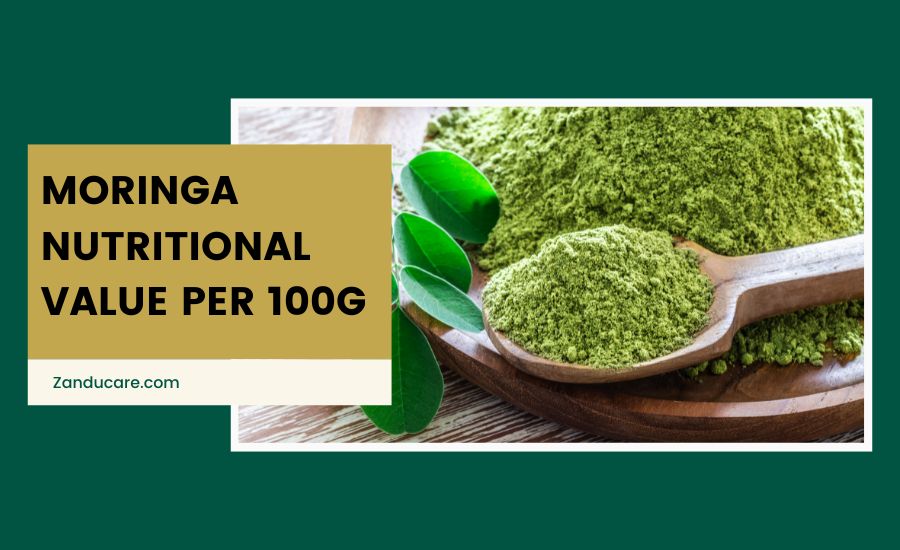
Moringa: Meaning, Nutritional Value, Health Benefits, & Uses
The drumstick tree, or Moringa oleifera, is a native Indian plant that has been used for many years in Ayurvedic treatment. Its leaves have been utilised for generations to promote general health and well-being and are valued for their high nutrient content. Moringa has recently become incredibly well-liked in the contemporary health and wellness community.
This blog post explores the Moringa nutritional value per 100g, including the abundant minerals, vitamins, and other beneficial substances found, to give a complete nutritional profile. We shall also look into the conventional Ayurvedic advantages of consuming Moringa.
|
Did You Know?
|
What is Moringa?

Originating in Asia, the Moringa tree is widely grown in Africa and South America. It is also called the "drumstick tree" because of its long, thin pods and the "miracle tree" because of its astounding array of applications.
Valuable in almost every aspect, the Moringa tree is prized for its medical qualities. Traditional cures for multiple ailments are made from Moringa’s leaves, fruits, seeds, bark, and roots.
In addition to being useful in lowering blood pressure, treating anaemia, and protecting the liver and kidneys, extracts from the Moringa tree have also shown promise in treating bacterial infections, digestive problems, and heart disease.
Animal husbandry uses the Moringa plant to cure wounds, fight parasites, and clean the water that animals consume.
Nutritional value of Moringa per 100g
The drumstick tree, or Moringa oleifera, has a remarkable nutritional profile. Moringa nutritional value per 100g provides many health advantages because it is concentrated and full of vital minerals.
Macronutrients:
- Protein: Moringa is high in protein, which gives the body the building blocks it needs.
- Carbohydrates and Fibres: It has dietary fibre to help with digestion and carbohydrates for energy.
- Fats: Moringa has a small amount of fat, some of which are unsaturated fats that are good for the heart.
Micronutrients:
- Vitamins: Important for many body processes, Moringa is a good source of B vitamins and vitamins A, C, and E.
- Minerals: Plenty of minerals are present, including calcium for strong bones, potassium for nervous system function, magnesium for muscular function, iron for forming red blood cells, and zinc for supporting immunity.
Phytonutrients:
- Antioxidants: The abundant antioxidants found in Moringa, including quercetin and chlorogenic acid, aid in the prevention of cell damage.
- Additional health-benefiting compounds: Flavonoids and polyphenols add to their general health advantages.
Health benefits of Moringa according to Ayurveda

Here, learn the key health benefits of eating Moringa in Ayurveda:
Dosha balancing
According to Ayurveda, Moringa is prized for fostering harmony between the three doshas that control our body and mind: Pitta, Kapha, and Vata.
- Vata Dosha: Manifested as dryness, anxiousness, and irregular digestion, Vata is regulated by the warming and grounding effects of Moringa.
- Pitta Dosha: Although Moringa has a slight heat content, its strong, bitter flavours balance Pitta, which is linked to excess fire, irritation, and digestive problems.
- Kapha Dosha: Known for its congestion, sluggishness, and lethargy, Moringa's drying and light properties aid in balancing Kapha.
Digestive health
The ancient Indian medicinal system known as Ayurveda acknowledges the beneficial effects of Moringa (Moringa oleifera) on digestion. Its leaves and pods support healthy gut flora and balance gut fire (Agni).
According to Ayurveda, the digestive advantages of Moringa stem from its ability to lower inflammation, promote regularity, and facilitate the absorption of nutrients. This all-encompassing strategy aims to maximise metabolism and digestion for general health.
Immune system support

For optimum health, Ayurveda strongly emphasises preserving a balanced internal environment. Moringa does the same, providing a natural way to promote a healthy immune system. Vitamin C, iron, zinc, other minerals, and antioxidants are abundant in Moringa, which supports the body's defence systems.
According to Ayurveda, maintaining a balanced gut flora, encouraging healthy digestion, and getting rid of toxins all contribute to a robust immune system. The capacity of Moringa to assist these processes adds to its ability to strengthen the body's defences.
Anti-inflammatory properties
Moringa (Moringa oleifera) is known for its numerous health benefits in Ayurveda, including its anti-inflammatory qualities. Substances like isothiocyanates found in Moringa leaves are thought to help lower inflammation in the body.
Moringa is used in Ayurveda to treat inflammation-related ailments like gout and arthritis. It's also used to treat inflammation-related pain and maintain the health of joints.
Studies are still underway to uncover the precise processes underlying the anti-inflammatory properties of Moringa. However, given its historical application in Ayurveda, it may have the ability to enhance general health by modulating inflammatory processes.
Detoxification
According to Ayurveda, sickness results from Ama, a poisonous byproduct of poor digestion and ambient pollutants that build up in the body. The Ayurvedic literature "Sigru" refers to Moringa, believed to have deep cleaning powers.
Antioxidants and vital minerals found in its leaves help the body's natural detoxifying processes. Moringa aids in the removal of Ama, creating a cleaner and better interior by boosting good digestion and supporting the liver and kidneys.
Moringa nutritional table
Here is a table representing Moringa nutritional value per 100g in detail:
|
Nutrient |
Moringa (100g) |
|
Calories |
64 kcal |
|
Protein |
9.4 g |
|
Carbohydrates |
8.3 g |
|
Dietary Fiber |
2.0 g |
|
Fat |
1.4 g |
|
Vitamin A |
7564 IU |
|
Vitamin C |
51.7 mg |
|
Vitamin E |
4.0 mg |
|
Vitamin K |
0.0 mcg |
|
Calcium |
185 mg |
|
Iron |
4.0 mg |
|
Magnesium |
147 mg |
|
Potassium |
337 mg |
|
Zinc |
0.6 mg |
|
Quercetin |
High |
|
Chlorogenic Acid |
High |
|
Polyphenols |
High |
|
Flavonoids |
High |
How to incorporate Moringa into your diet?
Moringa powder
Here’s how to include Moringa powder in your diet:
- Smoothies: For an added nutritional boost, blend 1 tsp of Moringa powder with your preferred fruits, veggies, and milk.
- Tea: For mild, earthy tea, steep 1 tsp of Moringa powder in boiling water for 5 to 10 minutes. For flavour, add lemon or honey.
- Recipes: To add minerals and flavour to soups, stews, salads, or cooked grains, sprinkle Moringa powder.
Start with a low dose and gradually increase it, depending on your preference.
Fresh Moringa leaves
The mildly spicy flavour of fresh Moringa leaves goes well with several dishes. To mix in the leaves, just finely chop them and add them to the dish.
Toss Moringa with tomatoes, cucumbers, and other lush greens in salads for a colourful, nutrient-dense garnish. For meals that are served hot, add chopped Moringa to soups and stews right before serving, or briefly sauté it with vegetables.
Moringa capsules and supplements
Supplements containing Moringa are available in various formats, with capsules providing a tasteless and handy choice. The usual dosage for capsules is 500–1,000 mg, and taking them twice a day is frequently advised.
Before beginning any supplement regimen, speak with a healthcare provider. This is especially true when determining the right dosage for your needs.
Also, do check:- nutrients in Drumstick
- 100% nature Nutritional super greens supplements
Precautions and potential side effects
In this section, understand the limitations, side effects, and precautions associated with using Moringa.
Who should avoid Moringa?
Although Moringa is generally considered harmless, Ayurveda cautions people with Pitta dosha imbalance to be cautious when using it. In the body, Pitta is connected to heat and fire.
The warming qualities of Moringa may increase Pitta, which could result in inflammation, overheating, or digestive problems. It is best to get advice from an Ayurvedic practitioner if you have a Pitta imbalance or if you suffer these symptoms after ingesting Moringa for assistance.
Possible side effects
Although Moringa is typically harmless, excessive dosages can result in digestive problems, including diarrhoea. Increase the amount gradually after starting small. Moringa may also interfere with prescription drugs. Before taking Moringa, see a doctor if you take any medications or have any underlying medical issues.
Conclusion
In a nutshell, Moringa is a significant addition to your diet due to its abundance of vitamins, minerals, and antioxidants. Ayurvedic principles seamlessly align with its capacity to balance doshas and enhance immunity, detoxification, and digestion.
Lastly, speak with an Ayurvedic practitioner for specific advice on including Moringa in your regimen and how much to take.
FAQs
1. What is the nutritional value of Moringa per 100g?
Every 100g of Moringa contains a considerable amount of protein, vitamin C, and vitamin A. Iron, magnesium, potassium, and calcium are also present. Quercetin, polyphenols, flavonoids, and chlorogenic acid—all healthy plant compounds—are plentiful in Moringa.
2. How does Moringa benefit the body according to Ayurveda?
Moringa is known in Ayurveda for its ability to balance doshas, especially Vata. Its high nutrient content, including vitamins and minerals, is supposed to promote immunity, a healthy digestive system, and general well-being.
3. Can I take Moringa every day?
A3. You can experience some prominent reduction in your cholesterol and blood sugar levels after consuming Moringa every day. However, it’s best to consult your healthcare practitioner to know the right dosage for your needs.
4. What are the side effects of Moringa?
If consumed excessively, Moringa can lead to side effects like digestive issues or diarrhoea.
5. How do I incorporate Moringa into my diet?
You can include some nutrient-dense Moringa powder in your diet. You have to whisk it into yoghurt, soups, and smoothies or sprinkle it over cooked veggies and salads. You can also have fresh leaves lightly sautéed or sliced in salads.
6. Is Moringa good for weight loss?
Since Moringa powder has a high nutritional profile and minimal calories, you can consider it an ideal weight-loss addition to your diet.
References
- The drumstick tree, or Moringa oleifera, is a native Indian plant that has been used for many years in Ayurvedic treatment. [https://www.sciencedirect.com/]
- Traditional cures for multiple ailments are made from moringa’s leaves, fruits, seeds, bark, and even roots. [https://www.ncbi.nlm.nih.gov/]
- Animal husbandry uses the moringa plant to cure wounds, fight parasites, and clean the water that animals consume. [https://pubmed.ncbi.nlm.nih.gov/]
- Moringa is used in Ayurveda to treat inflammation-related ailments like gout and arthritis. [https://www.researchgate.net/]





